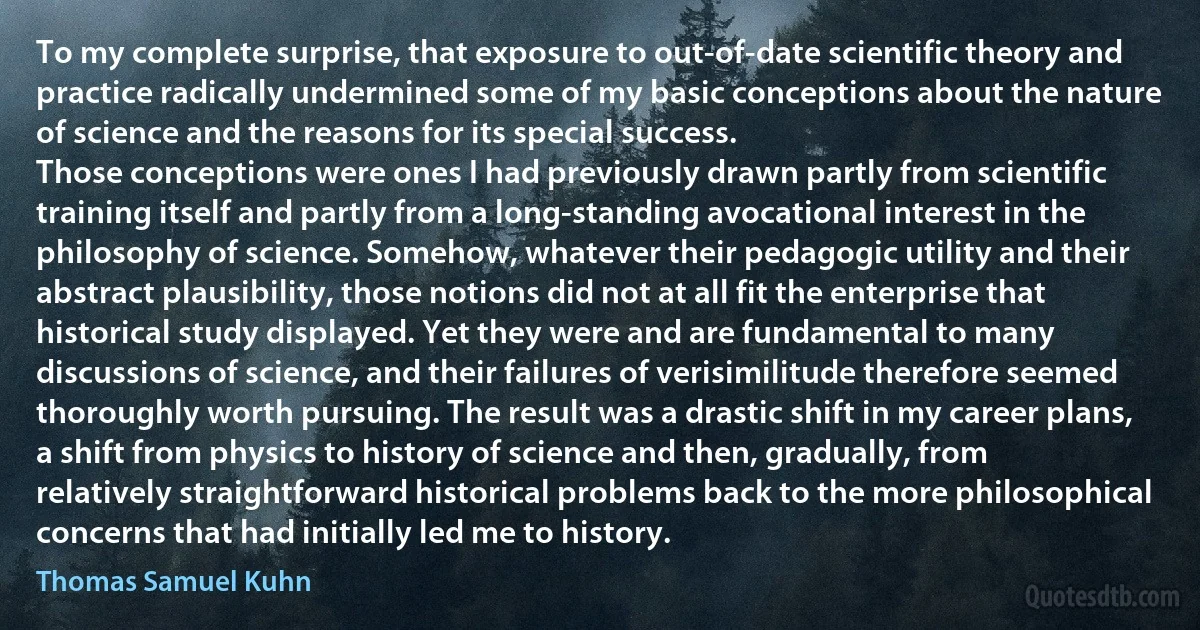
To my complete surprise, that exposure to out-of-date scientific theory and practice radically undermined some of my basic conceptions about the nature of science and the reasons for its special success. Those conceptions were ones I had previously drawn partly from scientific training itself and partly from a long-standing avocational interest in the philosophy of science. Somehow, whatever their pedagogic utility and their abstract plausibility, those notions did not at all fit the enterprise that historical study displayed. Yet they were and are fundamental to many discussions of science, and their failures of verisimilitude therefore seemed thoroughly worth pursuing. The result was a drastic shift in my career plans, a shift from physics to history of science and then, gradually, from relatively straightforward historical problems back to the more philosophical concerns that had initially led me to history.
Thomas Samuel KuhnRelated topics
abstract basic drastic draw exposure fit fundamental historical history interest led nature ones plausibility practice result science study success utility verisimilitude whatever worth yetRelated quotes
Had it merely called to our attention the existence and exact nature of certain fundamental gaps in economic theory, the Theory of Economic Behavior by von Neumann and Morgenstern would have been a book of outstanding importance. But it does more than that. It is essentially constructive: where existing theory is considered to be inadequate, the authors put in its place a highly novel analytical apparatus designed to cope with the problem.
It would be doing the authors an injustice to say that theirs is a contribution to economics only. The scope of the book is much broader. The techniques applied by the authors in tackling economic problems are of sufficient generality to be valid in political science, sociology, or even military strategy. The applicability to games proper (chess and poker) is obvious from the title. Moreover, the book is of considerable interest from a purely mathematical point of view.

Leonid Hurwicz
We cannot absolutely know that all these exact adaptations are the result of preconcert. But when we see a lot of framed timbers, different portions of which we know have been gotten out at different times and places, and by different workmen - Stephen, Franklin, Roger, and James, for instance - and when we see these timbers joined together, and see they exactly matte the frame of a house or a mill, all the tenons and mortices exactly fitting, and all the lengths and proportions of the different pieces exactly adapted to their respective places, and not a piece too many or too few, - not omitting even scaffolding - or, if a single piece be lacking, we see the place in the frame exactly fitted and prepared yet to bring such piece in - in such a case we find it impossible not to believe that Stephen and Franklin and Roger and James all understood one another from the beginning and all worked upon a common plan or draft drawn up before the first blow was struck.

Abraham Lincoln
Is not the reason of the confidence of the positive, critical, experimental scientists, and of the reverent attitude of the crowd towards their doctrines, still the same? At first it seems strange how the theory of evolution (which, like the redemption in theology, serves the majority as a popular expression of the whole new creed) can justify people in their injustice, and it seems as if the scientific theory dealt only with facts and did nothing but observe facts. But that only seems so. It seemed just the same in the case of theological doctrine: theology, it seemed, was only occupied with dogmas and had no relation to people's lives, and it seemed the same with regard to philosophy, which appeared to be occupied solely with transcendental reasonings. But that only seemed so. It was just the same with the Hegelian doctrine on a large scale and with the particular case of the Malthusian teaching.

Leo Tolstoy
I used to be a hide-bound Tory simply for traditional and antiquarian reasons-and because I had never done any real thinking on civics and industry and the future. The depression-and its concomitant publicisation of industrial, financial, and governmental problems-jolted me out of my lethargy and led me to reëxamine the facts of history in the light of unsentimental scientific analysis; and it was not long before I realised what an ass I had been. The liberals at whom I used to laugh were the ones who were right-for they were living in the present while I had been living in the past. They had been using science while I had been using romantic antiquarianism. At last I began to recognise something of the way in which capitalism works-always piling up concentrated wealth and impoverishing the bulk of the population until the strain becomes so intolerable as to force artificial reform.

H. P. Lovecraft
Feuerbach is the only one who has a serious, critical attitude to the Hegelian dialectic and who has made genuine discoveries in this field. He is in fact the true conqueror of the old philosophy. The extent of his achievement, and the unpretentious simplicity with which he, Feuerbach, gives it to the world, stand in striking contrast to the opposite attitude (of the others). Feuerbach's great achievement is: (1) The proof that philosophy is nothing else but religion rendered into thought and expounded by thought, i.e., another form and manner of existence of the estrangement of the essence of man; hence equally to be condemned;(2) The establishment of true materialism and of real science, by making the social relationship of "man to man” the basic principle of the theory; (3) His opposing of the negation of the negation, which claims to be the absolute positive, the self-supporting positive, positively based on itself.

Karl Marx
